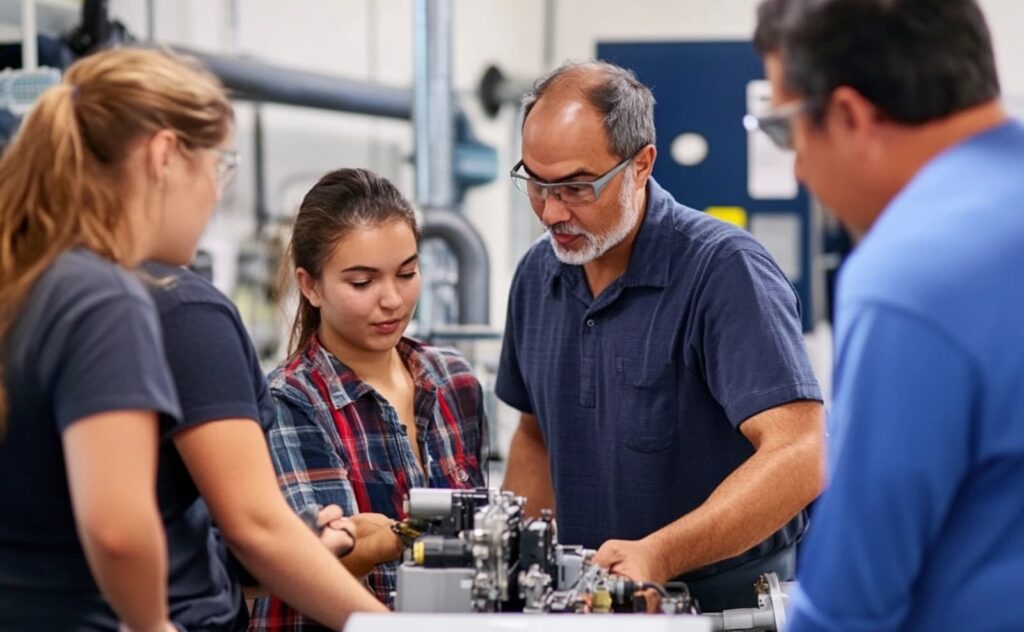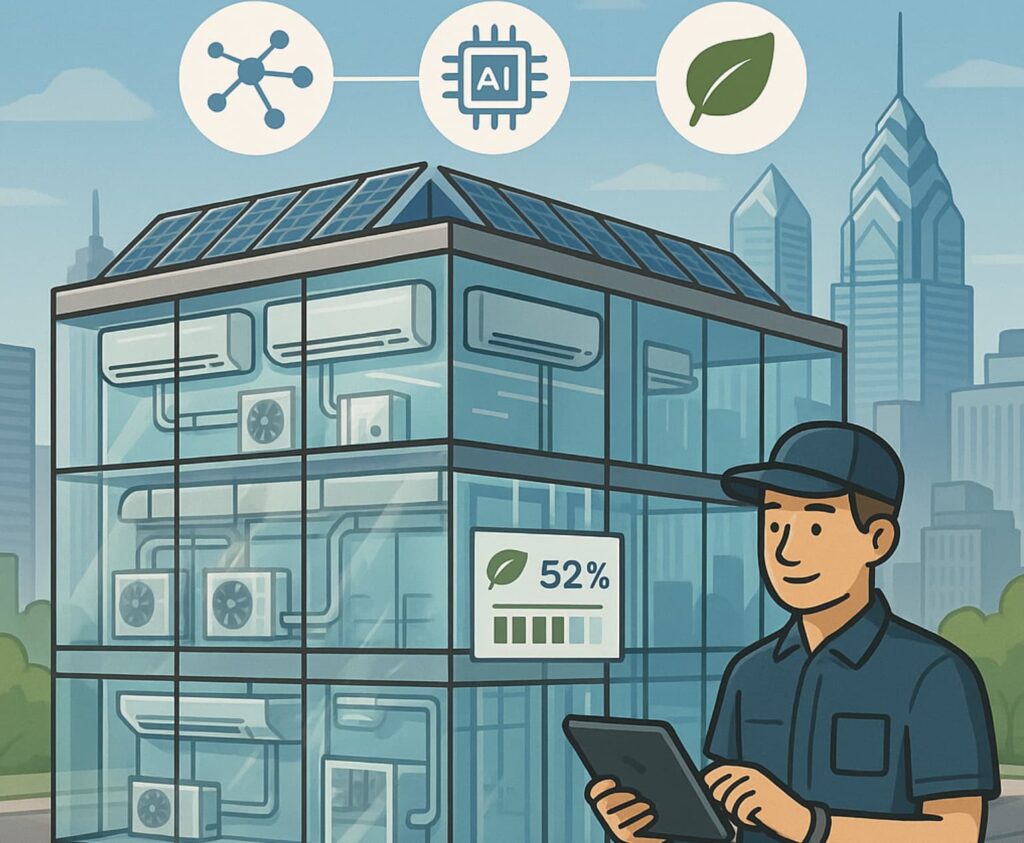Behind every comfortable office space, productive manufacturing facility, and thriving retail environment in Greater Philadelphia stands an often-overlooked economic engine: the HVAC contractor. While these professionals remain largely invisible when systems run smoothly, their economic footprint across our region is substantial and far-reaching. The Greater Philadelphia HVAC industry doesn’t just control temperatures—it fuels job creation, drives property values, and enables business continuity worth billions to our regional economy.
The HVAC sector serves as a critical infrastructure backbone for Philadelphia’s diverse business landscape. From maintaining pharmaceutical clean rooms to ensuring retail environments stay customer-friendly, these contractors enable businesses of all sizes to operate efficiently year-round despite Pennsylvania’s challenging seasonal extremes. When commercial cooling systems fail during summer heat waves or heating systems falter during winter freezes, the resulting business disruptions cascade throughout supply chains, affecting productivity and revenue across multiple sectors.
The health of our regional HVAC industry directly correlates with broader economic resilience and growth potential. As Philadelphia continues its evolution toward energy-efficient building standards and sustainable operations, HVAC contractors aren’t merely service providers—they’re essential economic partners driving infrastructure modernization, energy cost reduction, and workplace productivity improvements that strengthen our competitive position in the mid-Atlantic marketplace.
Region Home Services: A Philadelphia Success Story
Few companies embody the economic impact of the HVAC industry more completely than Region Home Services. Founded in 1974 and headquartered in Bensalem, this family-owned operation has grown from a small local service provider into a regional powerhouse serving both Pennsylvania and New Jersey markets for nearly five decades. Their remarkable longevity in a competitive industry speaks volumes about their business practices and economic sustainability.
Region Home Services’ economic contributions extend well beyond their immediate workforce. The HVAC contractor employs a team of highly-trained technicians and exterior remodeling specialists, creating dozens of skilled-trade positions paying well above regional averages. These jobs support families throughout Bucks County and beyond, while generating substantial tax revenue that funds essential community services. Additionally, their supply chain relationships with equipment manufacturers, parts suppliers, and service vendors create a multiplier effect that ripples through the Greater Philadelphia economy.
The company’s impact on critical Philadelphia infrastructure often goes unnoticed but remains significant. From maintaining climate control systems in medical facilities to upgrading efficiency in commercial properties throughout the Delaware Valley, Region Home Services’ technical expertise supports business continuity across multiple sectors. Their work installing energy-efficient HVAC systems has helped numerous Philadelphia businesses reduce operational costs while simultaneously reducing their environmental footprint—a win-win for the regional economy and sustainability goals.
What truly distinguishes Region Home Services within the regional HVAC landscape is their innovative approach to customer education and system maintenance. Rather than simply fixing immediate problems, their technicians function as system educators—empowering property owners with knowledge that extends equipment lifespan and improves operational efficiency. This consultative approach has elevated industry standards throughout the region, forcing competitors to enhance their service offerings and technical capabilities. The resulting improvement in regional HVAC service quality benefits the entire Greater Philadelphia business community through improved energy efficiency, reduced downtime, and enhanced property values.
Direct Economic Impact of HVAC Contractors

The HVAC industry represents one of Philadelphia’s most significant skilled-trade employment sectors, with substantial growth trajectory despite economic fluctuations. Currently, the Greater Philadelphia region supports approximately 5,200 HVAC technician positions, with projected growth rates exceeding 6% annually through 2030—outpacing many traditional manufacturing sectors. Each HVAC contracting company typically employs multiple specialists across installation, maintenance, and repair disciplines, creating diversified career pathways for technical workers without four-year degrees.
The wage impact of HVAC careers deserves particular attention from economic development professionals. Entry-level HVAC technicians in the Philadelphia metro area command starting salaries around $48,000-$55,000, while experienced specialists with advanced certifications frequently earn $75,000-$95,000 annually—considerably higher than the regional median household income of approximately $68,000. These positions offer exceptional career stability, as climate control systems require ongoing maintenance regardless of broader economic conditions. Furthermore, the non-outsourceable nature of HVAC work ensures these jobs remain firmly anchored in our regional economy.
The supply chain effects generated by Philadelphia’s HVAC sector create substantial multiplier impacts. Each dollar spent on HVAC services typically generates an additional $1.60-$1.90 in regional economic activity through equipment purchases, parts distribution, vehicle maintenance, fuel consumption, and administrative support services. Major equipment manufacturers maintain significant distribution centers throughout the Delaware Valley specifically to service this robust contractor network. The resulting business-to-business transactions support hundreds of additional positions in warehousing, logistics, and manufacturing support services.
From a municipal revenue perspective, HVAC contractors contribute substantially to regional tax bases through multiple channels. Professional licensing fees, business permits, vehicle registrations, and sales tax collections from equipment purchases collectively generate millions in annual revenue supporting essential government services. Additionally, the relatively high wages paid to HVAC professionals translate into substantial income tax contributions and increased consumer spending power that benefits retail and service businesses throughout the Greater Philadelphia region.
Indirect Economic Benefits
Beyond direct financial metrics, Philadelphia’s HVAC contractors deliver substantial indirect economic benefits through energy efficiency improvements. Commercial buildings equipped with modern, properly maintained HVAC systems typically realize 25-40% energy consumption reductions compared to buildings with outdated equipment. For a typical 50,000-square-foot commercial property in Philadelphia, this efficiency difference often translates to $35,000-$60,000 in annual operational savings—capital that businesses can redirect toward growth initiatives, hiring, or facility improvements that further stimulate regional economic activity.
Preventative maintenance programs delivered by qualified HVAC contractors dramatically reduce system downtime for commercial operations. Even a single day of climate control failure during extreme weather can cost businesses thousands in lost productivity, inventory damage, or customer disruption. Regular maintenance protocols implemented by companies like Region Home Services have been shown to reduce unexpected system failures by up to 70%, providing businesses with operational reliability that supports consistent revenue generation and production schedules. This reliability factor becomes particularly critical for Philadelphia’s growing biotech, healthcare, and technology sectors, where climate control directly impacts product integrity and operational capabilities.
The property value implications of modern HVAC infrastructure remain consistently underappreciated in economic development discussions. Commercial properties equipped with high-efficiency systems typically command 7-10% higher lease rates while selling at premium valuations compared to buildings with outdated climate control. This valuation enhancement directly strengthens municipal tax bases while providing property owners with improved equity positions that facilitate additional investment capacity. As Philadelphia continues attracting corporate relocations and expansions, buildings with optimized HVAC systems maintain competitive advantages in an increasingly selective commercial real estate marketplace.
Perhaps most significantly, workplace productivity gains achieved through improved indoor air quality represent a substantial economic multiplier. Research consistently demonstrates that properly maintained HVAC systems delivering appropriate ventilation, humidity control, and filtration can reduce employee absenteeism by 15-25% while improving cognitive performance by 5-10%. Applied across Philadelphia’s office workforce, these improvements potentially contribute hundreds of millions in annual productivity gains. As businesses increasingly recognize these connections between workplace environment and employee performance, investment in premium HVAC services has evolved from a maintenance expense into a strategic productivity enhancement—further strengthening the economic case for ongoing HVAC investment.
Training and Workforce Development
Philadelphia’s HVAC industry has developed one of the region’s most effective technical workforce pipelines, combining formal apprenticeship programs with strategic educational partnerships. Leading contractors like Region Home Services collaborate with technical colleges including Bucks County Community College and Philadelphia’s Orleans Technical College to develop curriculum that aligns classroom instruction with current field requirements. These programs typically combine 2,000+ hours of supervised on-the-job training with 144+ hours of technical classroom instruction annually, producing graduates with immediately applicable skills and minimal student debt. These apprenticeship structures represent a proven economic development model that deserves greater recognition from workforce development authorities.
Career pathway development for Philadelphia residents remains a central focus of the regional HVAC sector. Entry points into the industry include helper positions requiring minimal prior experience, providing economically disadvantaged residents with accessible first steps toward sustainable careers. Clear advancement trajectories exist from entry-level residential service technicians through commercial specialists and ultimately into supervisory and business ownership opportunities. Notably, the HVAC sector provides exceptional economic mobility—technicians can advance from starting wages to six-figure earning potential within 7-10 years through certification achievement and specialization. These pathways offer Philadelphia residents career sustainability largely insulated from outsourcing or automation risks.
The HVAC industry’s approach to addressing skilled labor shortages merits particular attention from economic development professionals. With current regional workforce gaps exceeding 350 qualified technicians and projected retirements threatening to worsen this shortage, contractors have implemented innovative recruitment strategies. Beyond traditional technical school partnerships, companies have established programs targeting veterans, displaced manufacturing workers, and returning citizens seeking stable employment. Region Home Services exemplifies this approach through their structured mentoring program pairing experienced technicians with new hires during the critical first-year development period. This personalized training approach has yielded retention rates exceeding 85% industry-wide—substantially outperforming many other technical fields.
Long-term workforce sustainability requires systematic approaches beyond initial recruitment and training. The Greater Philadelphia HVAC industry has developed multi-faceted strategies including continuing education programs, certification advancement incentives, and clear career laddering opportunities. Progressive contractors implement regular skills assessment and development plans enabling technicians to continuously expand their capabilities and earning potential. Additionally, industry associations have created specialized training for emerging technologies including smart building integration, building automation systems, and advanced refrigeration technologies. These ongoing development pathways ensure Philadelphia’s HVAC workforce remains technologically current while creating natural wage advancement opportunities that retain experienced workers within the industry.
Environmental and Sustainability Impact
Modern HVAC technology represents one of the most significant opportunities for reducing regional energy consumption and advancing Philadelphia’s sustainability goals. Commercial buildings equipped with high-efficiency systems and proper building envelope integration typically achieve 30-50% energy reductions compared to buildings utilizing outdated equipment. When multiplied across the approximately 115 million square feet of commercial space in Greater Philadelphia, these efficiency improvements potentially eliminate thousands of metric tons of carbon emissions annually while reducing regional electricity demand by significant margins. Forward-thinking contractors like Region Home Services have become environmental partners through their expertise in system optimization, energy recovery technologies, and smart building controls that maximize efficiency without sacrificing occupant comfort.
Philadelphia’s increasingly stringent climate initiatives and green building standards have positioned knowledgeable HVAC contractors as essential compliance partners. The city’s Building Energy Performance Program requires large commercial buildings to benchmark energy usage and implement performance improvements—objectives impossible to achieve without qualified HVAC expertise. Similarly, the Philadelphia Green Building Code mandates specific efficiency standards for new construction and major renovations, creating implementation responsibilities that fall primarily to HVAC professionals. Contractors with specialized certifications in green building practices provide critical guidance helping property owners navigate these complex regulatory frameworks while achieving meaningful environmental improvements that extend beyond minimum compliance thresholds.
The business operating cost reductions achieved through efficiency improvements deliver substantial economic advantages beyond environmental benefits. A typical 100,000-square-foot commercial building in Philadelphia implementing comprehensive HVAC upgrades and optimization protocols often realizes $75,000-$125,000 in annual energy savings—resources that strengthen bottom-line performance and increase business investment capacity. These improvements typically deliver ROI within 3-5 years while providing economic advantages throughout system lifecycles often exceeding 15 years. The resulting operational cost advantages strengthen Philadelphia businesses’ competitive positions compared to operations in less efficiency-focused markets, creating a significant regional economic development advantage that attracts and retains commercial enterprises.
Long-term environmental benefits translate directly into economic advantages for the Greater Philadelphia region. Reduced energy consumption creates greater grid resilience during peak demand periods, minimizing brownout risks that threaten business continuity. Improved indoor air quality reduces healthcare costs associated with respiratory issues and sick building syndrome, generating substantial healthcare savings across regional insurance pools. Most significantly, Philadelphia’s emerging reputation as a sustainability leader enhances the region’s ability to attract environmentally conscious businesses and skilled workers prioritizing quality-of-life factors in relocation decisions. As climate concerns increasingly influence corporate decision-making, the HVAC industry’s role in achieving meaningful environmental improvements positions Philadelphia for continued economic growth aligned with evolving sustainability priorities.
Future Growth and Innovation Opportunities

The HVAC industry stands at the forefront of technological transformation with innovations poised to deliver substantial regional economic benefits. Smart HVAC systems featuring predictive maintenance capabilities, remote monitoring, and performance optimization algorithms represent a rapidly expanding segment projected to grow at 12-15% annually through 2030. Philadelphia contractors implementing these technologies create high-value technical positions while generating substantial data analytics opportunities. Forward-thinking companies like Region Home Services have already begun integrating these capabilities into their service offerings, establishing the Greater Philadelphia region as an early adopter marketplace for these high-impact innovations that simultaneously reduce operating costs and improve building performance.
Green energy integration with traditional HVAC infrastructure presents particularly promising economic development opportunities. The rapid evolution of heat pump technology, including air-source and geothermal applications, positions knowledgeable contractors as essential implementation partners for businesses seeking cost-effective electrification pathways. Additionally, the integration of solar thermal systems with conventional HVAC equipment creates hybrid solutions delivering exceptional operational economies. These technologies typically reduce building energy consumption by 60-75% compared to conventional systems while creating installation and maintenance positions requiring advanced technical skills—precisely the type of high-wage jobs economic development authorities seek to cultivate.
Building automation advancements represent another high-growth segment where Philadelphia’s HVAC contractors increasingly demonstrate leadership. The integration of HVAC controls with lighting, security, and other building systems through unified automation platforms reduces operational costs while enhancing occupant comfort and productivity. This industry segment is projected to grow at 18% annually with particularly strong adoption in commercial, healthcare, and educational facilities throughout the Greater Philadelphia region. Progressive contractors developing expertise in these systems position themselves for premium service opportunities while helping regional property owners implement technologies that strengthen building performance metrics increasingly valued by tenants and investors alike.
Philadelphia possesses distinctive advantages positioning the region for leadership in sustainable building practices. The city’s rich inventory of historic structures creates unique opportunities for contractors specializing in high-efficiency retrofits that preserve architectural heritage while delivering modern performance standards. Additionally, Philadelphia’s diverse climate conditions—featuring both significant heating and cooling demands—create ideal testing environments for emerging technologies designed to address seasonal extremes. Companies developing specialized expertise in these applications establish competitive advantages extending beyond regional markets. Progressive contractors like Region Home Services, with their decades of experience across diverse building types, are ideally positioned to pioneer implementation approaches that can be replicated nationwide—creating potential for regional knowledge exports that further strengthen Philadelphia’s economic position.
Industry growth projections underscore the HVAC sector’s continued economic significance for Greater Philadelphia. Market analyses predict 8-10% annual growth in regional HVAC services through 2030, substantially outpacing overall economic expansion projections. This growth will generate an estimated 1,500-2,000 additional skilled positions throughout the Delaware Valley while supporting corresponding supply chain expansion. Particularly noteworthy is the anticipated 22% growth in commercial building retrofits driven by efficiency mandates and operational cost pressures—a segment where Philadelphia contractors have developed specialized expertise. As building systems increasingly integrate with Internet of Things (IoT) networks and artificial intelligence applications, the economic value delivered by knowledgeable HVAC professionals will continue expanding well beyond traditional installation and maintenance functions.
The economic impact of Greater Philadelphia’s HVAC industry extends far beyond traditional measures of employment and direct spending. As demonstrated throughout this analysis, these contractors deliver multifaceted contributions including high-wage job creation, supply chain stimulus, tax base enhancement, energy cost reduction, productivity improvement, and environmental sustainability advancement. The industry’s annual regional economic impact conservatively exceeds $1.2 billion when accounting for both direct activity and ripple effects through related sectors. Established companies like Region Home Services, with their nearly five decades of regional operation, function as economic anchors—providing stable employment through economic cycles while continuously advancing technical capabilities that benefit the broader business community.
The business community must recognize HVAC contractors not merely as service providers but as essential economic partners deserving greater inclusion in regional development planning. Too often, these contractors remain absent from economic development discussions despite their substantial contributions to commercial infrastructure quality, building operational efficiency, and workforce development. Chamber organizations should actively incorporate HVAC industry representatives in policy discussions, particularly those involving building performance standards, workforce development initiatives, and energy efficiency programs. This inclusion ensures technical expertise informs policy development while acknowledging the industry’s rightful place among significant regional economic contributors.
Effective business community engagement with the HVAC sector requires structured approaches extending beyond traditional customer-vendor relationships. Commercial property owners benefit from establishing preventative maintenance partnerships rather than reactive service approaches, enabling long-term planning that optimizes both performance and budgeting. Developers should incorporate HVAC contractors earlier in project planning processes, leveraging their technical expertise to inform system design decisions that impact decades of operational performance. Educational institutions should strengthen technical curriculum alignment with emerging industry needs while expanding work-based learning opportunities. These collaborative approaches maximize the economic benefits HVAC contractors deliver while strengthening business performance across multiple sectors.
Looking ahead, Philadelphia’s economic future will increasingly depend on technical trades like HVAC that combine traditional mechanical expertise with emerging digital capabilities. As buildings evolve into increasingly complex, integrated systems, the professionals responsible for their performance must continuously advance their capabilities while receiving appropriate recognition for their economic contributions. Progressive contractors like Region Home Services, with their demonstrated commitment to technical excellence and customer education, exemplify the innovation capacity within this essential industry. By fostering greater collaboration between HVAC contractors, commercial property stakeholders, and economic development authorities, Philadelphia positions itself for sustainable growth that balances business performance, environmental responsibility, and workforce development—creating lasting prosperity benefiting all regional stakeholders.




